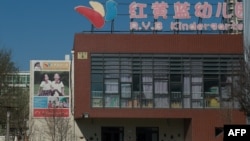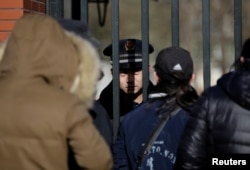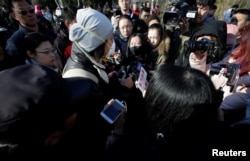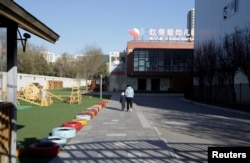A high-profile case of alleged child abuse at a nursery in China's capital has triggered a nationwide inspection of early learning facilities and shocked parents across the country.
The incident is not the first this year, but one in a growing number of cases to hit China’s booming early education industry.
But how authorities respond to the case is key, as early education is seen as a crucial link – some argue the weakest link - in the authoritarian Communist Party’s aspirations to turn China into a global education powerhouse.
During the recently concluded 19th Party Congress, the Communist Party listed preschool education as a key link in its efforts to develop the country’s education system. Officials aim to boost enrollment to 85 percent by 2020, by which time analysts predict the industry could be worth as much $50 billion.
However, since the Party Congress wrapped up, China has been wracked with two major preschool scandals in two of the country’s most prominent cities – Shanghai and Beijing.
In early November, videos surfaced of teachers at an employee nursery in Shanghai for the online travel giant Ctrip violently shoving students around and apparently force-feeding others to eat wasabi.
The case in Beijing at RYB Education, a company that recently listed on the New York Stock Exchange, has triggered even bigger shockwaves. Part of the reason for this is that the company is listed overseas and the severity of the accusations, which include not only physical, but also alleged sexual abuse.
“There have been reports before about abuse at schools. I think that what is different about this is that it is Beijing," said Lenora Chu, author of the book "Little Soldiers, An American Boy, a Chinese School and the Global Race to Achieve." "Because it is a private school, because these are middle class parents with money, I hope that change will begin to happen."
According to allegations from parents of toddlers attending RYB in Beijing, the children were given pills, apparently to sleep, and pricked with needles.
Some told their parents that they were given physical exams by men while naked and that one of the men was also not clothed.
In response, RYB has established a special task force to carry out what it calls a “thorough self-inspection across all teaching facilities.” It was not immediately clear how that inspection would be carried out.
The company operates about 1,300 day care centers in about 300 cities across China.
Authorities in Beijing have detained four people in connection with the case and the principal of the school has been removed. However, only one is a teacher, the other three were detained for spreading rumors.
According to state media reports, authorities in Beijing have requested that all schools appoint an inspector at every kindergarten and that more cameras are added to classrooms – and that some will even be linked directly to police stations.
Some are hopeful that the high-level of attention the incident has stirred up will bring about some much-needed change to a problem that has been festering for years.
Xue Xinya, head of the sociology and social work department at Xi’An Northwestern University, said China’s early childhood education system has been a bit deficient ever since the country began opening up to economic reforms and shifting away from a planned economy.
At that time “it was the company in charge, and it was your own people, taking care of your kids; everybody knew each other, and in general things were managed strictly. Under the planned economy, people were simpler, they just wouldn’t dare to abuse anyone.” Xue said.
After that era, state owned enterprises stopped providing social services, and there were fewer and fewer schools to care for children below the age of three. As China looks to grow its industry and ensure quality, one thing that is more important than technical training is professional ethics and values.
“[Professional] values education is very, very important for early childhood education, social work, and elementary school teachers. The country’s whole educational system ought to reflect this, like doctors in the West - when you act as a doctor you have a Hippocratic Oath,” she said.
China’s leaders want more private investment to flow into preschool education, but analysts note some are hesitant because of a lack of clear guidelines and too many barriers. No single government agency is clearly in charge of the sector and preschool care is overseen by several ministries including the Ministry of Education, National Health and Family Planning Commission and Ministry of Civil Affairs.
Some have called for the drafting of a Preschool Education Law to make clear government responsibilities such as management, funding, teacher training, supervision and assessment.
Others note that legal amendments are needed to account for the impact such traumatic incidents can have on vulnerable young children.
“The biggest impact on these children is psychological. Many of these cases are uncovered when children are suddenly wetting their bed, having nightmares or refusing to go to school.
But according to China’s criminal code there currently is no valuation given for the psychological impact such incidents could have on children,” said lawyer Si Zuoyang.
Although the RYB case in Beijing has taken the nation by storm, it is not the first time that its schools have faced accusations.
In 2015, four teachers from one of its schools in the northern province of Jilin also faced similar charges and were found guilty of abuse and poking some 17 children with a needle.
Two of the teachers were sentenced to two years and six months in prison, the others to two years and 10 months. Three years is the maximum sentence for the crime of “Maltreatment or Neglect by a Parent or Caretaker,” a sentence ceiling some argue needs to be raised.
Joyce Huang and Brian Kopczynski contributed to this report.











